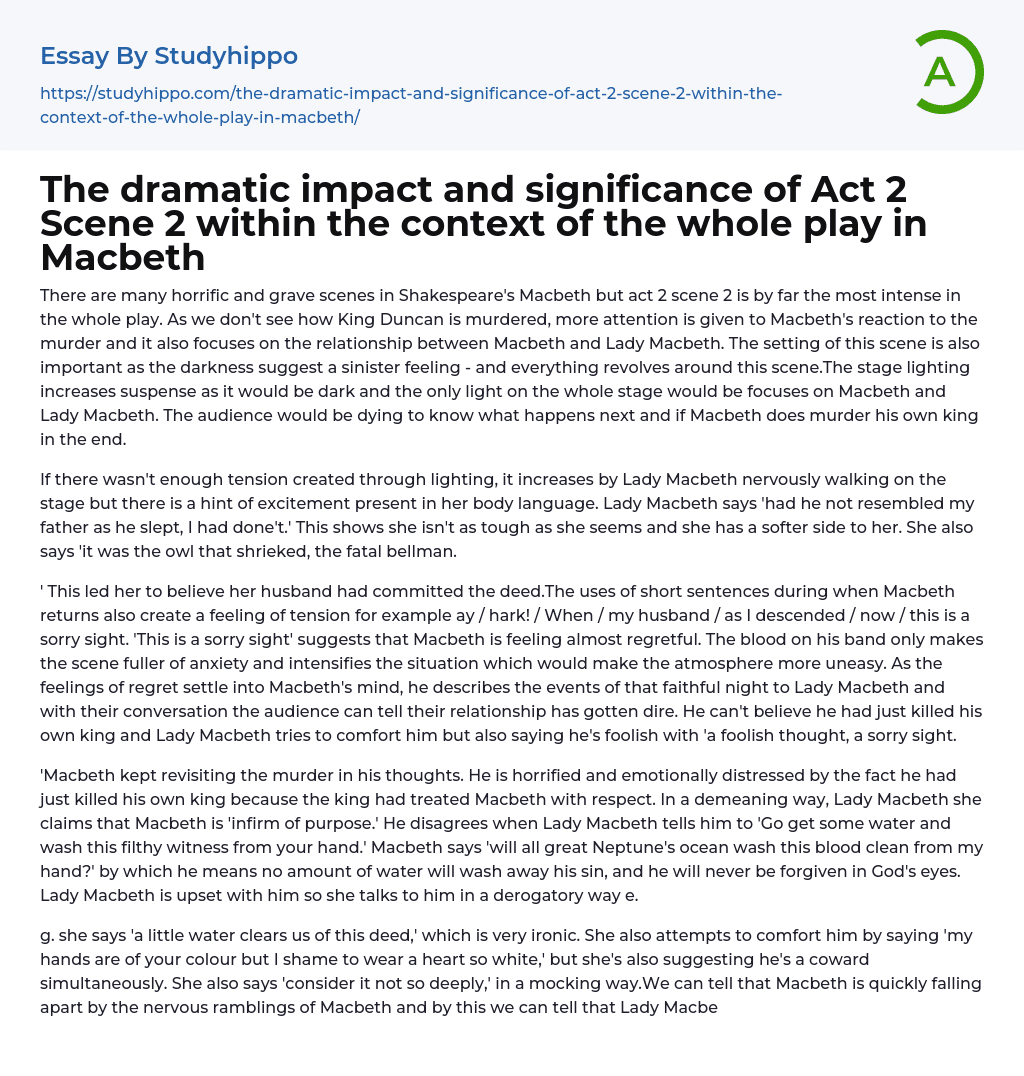Macbeth by Shakespeare contains several terrifying and grave scenes, however, act 2 scene 2 is undeniably the most intense. The audience is not shown the murder of King Duncan but rather, Macbeth's reaction to the crime and the dynamics between him and Lady Macbeth. Additionally, the gloomy setting contributes to a sinister atmosphere. This pivotal scene increases anticipation as the lighting is dim and focused solely on Macbeth and Lady Macbeth, leaving viewers eager to learn whether or not Macbeth will follow through with regicide.
If the lighting wasn't sufficient to create tension, Lady Macbeth's nerve-wracking walk onstage amplifies it, although her body language hints at excitement. Lady Macbeth reveals her vulnerability by stating that she would have killed King Duncan if he didn't resemble her father while asleep. She utters the words 'it was the
...owl that shrieked, the fatal bellman,' implying that a bad omen foretold of the crime.
In Macbeth, the use of short sentences upon his return creates a tense atmosphere which leads Lady Macbeth to believe that he has committed a terrible deed. Macbeth's regretful feelings are conveyed through his statement "this is a sorry sight" and the blood on his hands only heightens the unease. As he recounts the events of that fateful night to Lady Macbeth, their relationship becomes strained and she attempts to comfort him while also deeming his thoughts foolish.
Macbeth is haunted by the murder he committed, experiencing horror and emotional distress. He killed his own respected king, making him feel guilty. Lady Macbeth belittles him by saying he is weak-willed. Macbeth disagrees with her suggestion to wash his hands to cleanse himself of the sin, sayin
not even an ocean could wash it away and he will not be forgiven by God. Lady Macbeth speaks to him in a disrespectful manner.
In a display of irony, Lady Macbeth asserts that "a little water clears us of this deed", but simultaneously attempts to console her husband by stating "my hands are of your colour but I shame to wear a heart so white". However, by implying that Macbeth is cowardly, she undermines her comforting words and mocks him when she says "consider it not so deeply". Macbeth's nervous rambling reveals that he is falling apart, indicating that Lady Macbeth is the dominant partner in their relationship. Despite her husband's impending breakdown, Lady Macbeth remains in control and unaffected by the situation.
Tension grips Macbeth as he recalls the words that plagued him while murdering the king: "Glamis hath murther'd sleep, and therefore Cawdor shall sleep no more." He fears it may be another of the witches' prophecies. The anticipation heightens with a knock at the door, leaving Macbeth and Lady Macbeth on edge, worried someone might have discovered the murder.
Lady Macbeth exhibits mental strength as she returns the daggers to Duncan's grooms while Macbeth falls apart. This would have been controversial in Shakespeare's era where sexual equality had not been attained. As the knocking persists, Lady Macbeth becomes increasingly anxious about the possibility of being caught for their crime. She takes charge of the situation by instructing her husband to their chamber to eliminate any evidence of the murder. Shakespeare skillfully builds tension throughout the scene, releasing it and building it again for a greater impact on the audience towards the conclusion.
Utilizing
dramatic techniques such as irony and indecision enhances the tension and captivates the audience, while also making the characters more realistic. Hence, Act 2 Scene 2 serves as the pivotal moment of the play, as it creates an atmosphere of apprehension, suspense and unease which sets the tone for the rest of the production.
- Tension essays
- Banquo essays
- Macbeth Ambition essays
- Adhd essays
- Antisocial Personality Disorder essays
- Anxiety essays
- Bipolar Disorder essays
- Depression essays
- Depression And Anxiety essays
- Dyslexia essays
- Learning Disability essays
- Major Depressive Disorder essays
- Mental Disorder essays
- Mental Illness essays
- Psychosis essays
- Schizophrenia essays
- Stress essays
- Suicide essays
- A Doll's House essays
- A Midsummer Night's Dream essays
- A raisin in the sun essays
- A Streetcar Named Desire essays
- An Inspector Calls essays
- Death of a salesman essays
- Everyman essays
- Fences essays
- Hamlet essays
- Hedda Gabler essays
- Iago essays
- King Lear essays
- Macbeth essays
- Much ado about nothing essays
- Oedipus Rex essays
- Oedipus The King essays
- Othello essays
- Pygmalion essays
- Romeo And Juliet essays
- Tartuffe essays
- The glass menagerie essays
- The Importance of Being Earnest essays
- The Merchant Of Venice essays
- The Taming of The Shrew essays
- Twelfth Night essays
- Waiting For Godot essays




